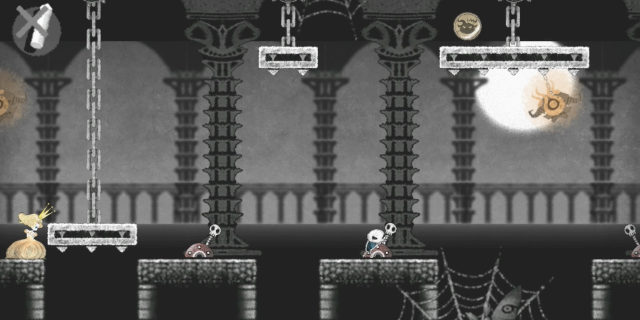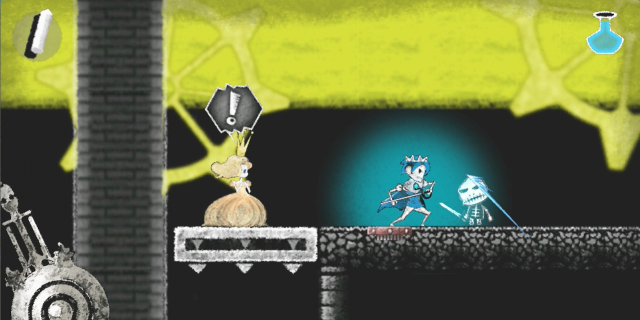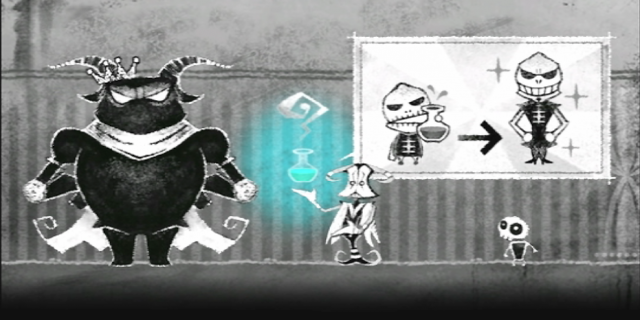
If there’s anything the Vita needs right now, it’s games that take full advantage of the system’s features. It also just needs games in general, but the ones that fully use the capabilities of the hardware are especially welcome. Dokuro is one of those games, blending together 2D platforming with some intriguing, if flawed, puzzle mechanics that use some of the Vita’s features in interesting ways.
From the moment you start the game, you’re greeted with some stylistic visuals that are both gorgeous and set the stage for what to expect from some of the mechanics. The chalk-like aesthetics, combined with the creatively-designed levels and enemies, add up to a strikingly-beautiful presentation.
The music seemed pleasant at first, but once you realize how repetitive it all sounds and how much you’ll be hearing it throughout, it might begin to drive you insane. It’s not often when I feel compelled to mute a game, but this was one of the few times I felt the needed to do so after not even an hour of gameplay.

The main hook of the game is an attempted rescue; your goal is to save a princess from a demon-like creature, and to do that you need to make sure the path in front of her is safe at all times. She will move on her own, but will stop when facing obstacles in her path, meaning there aren’t many instances when she will wander off and get herself killed. If you boil it down, the entire game is one lengthy escort mission, which sounds horrible, but the princess’ A.I. is such that it almost never interferes with your puzzle solving.
The puzzles themselves are generally solid and have a ton of variety. Each individual chapter has a new mechanic that is introduced, and once you reach the later levels, you’ll be dealing with multiple mechanics at once.
Some of these work rather well, including the ability to draw lines on the Vita’s touch screen to create ropes that connect things in the environment using a magical piece of chalk. There are many different types of chalk as well, and as each is introduced, the puzzles become both trickier and, usually, more enjoyable as a result. And like with any good puzzle game, getting past tricky levels is immensely satisfying. Other mechanics, including the expert use of reversing the gravity in an area, continue to add to the already enjoyable skills you pick up along the way.

Unfortunately, not all of the puzzles are winners. Some of them involve such precise timing and finesse that the touch screen simply does not allow. These puzzles come up every so often, completely killing the game’s pacing. Some involve making sure you move things in a precise way to create a path for the princess, while also watching out for other environmental hazards that could interfere. When they require such specific timing on a button press or your ability to quickly draw a line that is recognized by the game while you also have to worry about the princess’ movements, it can be a hassle.
One of the other main mechanics is the ability to transform your tiny character into a heroic “prince.” Once transformed, you can carry the princess, which is absolutely vital to solve certain puzzles, and you can also defeat enemies, which can get in the way during certain sections of the game. This mechanic only works half of the time. First, it involves you double tapping the touch screen to activate, and I often had trouble doing this when I was in a hurry during some of the puzzles that require a lot of quick thinking. Thankfully you can switch the activation of this to the R button, but even there it is a mechanic that isn’t as responsive as it should be.
Dokuro is a game that should have been an automatic must-buy for all Vita owners, but it falls short at the worst possible times. For every five amazing puzzles, there are one (or more) that are so poorly designed they can completely kill your enjoyment of the game. If you can work your way past those puzzles and adjust to some of the game’s poor mechanics, there is a lot to enjoy about Dokuro. It’s a lengthy, charming little game that sometimes stumbles, but when it works, it really works.
Pros: Excellent visuals, some interesting mechanics and fun puzzles
Cons: Repetitive music, some poorly designed mechanics and tedious puzzles



















